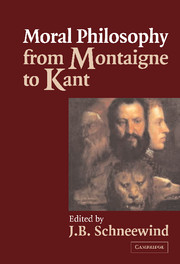Book contents
- Frontmatter
- Contents
- Preface
- Acknowledgments
- Foreword to the One-Volume Reprint
- Introduction
- PROLEGOMENA: SOME QUESTIONS RAISED
- PART I REWORKING NATURAL LAW
- PART II INTELLECT AND MORALITY
- Guillaume Du Vair
- René Descartes
- Benedict de Spinoza
- Nicholas Malebranche
- Ralph Cudworth
- Samuel Clarke
- Gottfried Wilhelm Leibniz
- Christian Wolff
- PART III EPICUREANS AND EGOISTS
- PART IV AUTONOMY AND RESPONSIBILITY
- Supplemental Bibliography
Gottfried Wilhelm Leibniz
Published online by Cambridge University Press: 05 June 2012
- Frontmatter
- Contents
- Preface
- Acknowledgments
- Foreword to the One-Volume Reprint
- Introduction
- PROLEGOMENA: SOME QUESTIONS RAISED
- PART I REWORKING NATURAL LAW
- PART II INTELLECT AND MORALITY
- Guillaume Du Vair
- René Descartes
- Benedict de Spinoza
- Nicholas Malebranche
- Ralph Cudworth
- Samuel Clarke
- Gottfried Wilhelm Leibniz
- Christian Wolff
- PART III EPICUREANS AND EGOISTS
- PART IV AUTONOMY AND RESPONSIBILITY
- Supplemental Bibliography
Summary
Introduction
Leibniz, born in 1646 in Leipzig, was a child of an academic family. During his early years he read widely, and although he studied law, he never confined his interests to any single subject. After finishing his formal education, he spent some time carrying out diplomatic and legal functions for a minor German prince. Leibniz then spent four years in Paris and in 1676 attached himself to the ruling family of Hanover. He spent the rest of his life in the service of successive Hanoverian rulers. The last one he served, Georg Ludwig, became the king of England in 1714. Leibniz, deeply interested in European unity and harmony, saw the reunification of Protestant and Catholic confessions as necessary for that accomplishment. He hoped his own philosophical work might help, by producing a generally acceptable religious view. He carried out extensive historical research for his masters, worked on increasing cooperation of scientists of all nations, kept up with advances in technology, and, in addition to all this, did fundamentally important work in mathematics, logic, and metaphysics. Leibniz published a variety of papers but only one book, the Theodicy (1710), which was an attempt to resolve the problem of evil. When he died in 1716, he left behind a vast mass of manuscripts from which selections have gradually been published and of which no complete edition yet exists.
A man of astonishing versatility, intellectual power, and originality, Leibniz was also in many respects quite conservative.
- Type
- Chapter
- Information
- Moral Philosophy from Montaigne to Kant , pp. 313 - 330Publisher: Cambridge University PressPrint publication year: 2002

